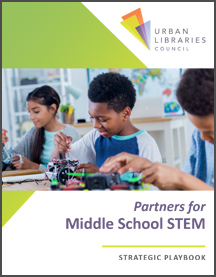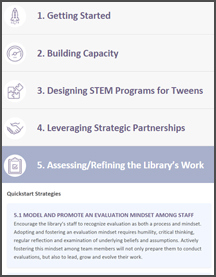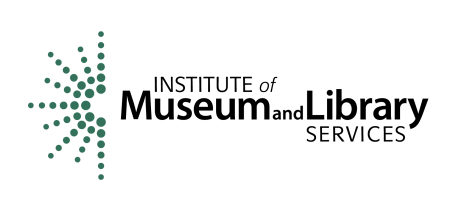Apply Lessons Learned from This Initiative:
|
“Middle school is a critical time in a child’s education process and the perfect time to introduce STEM to underserved, low-income students. We want to bridge any gaps to ensure all students are building their STEM skills.”
Former ULC President and CEO Susan Benton
About This Initiative
Developed in partnership with the National Center for Interactive Learning at the Space Sciences Institute and funded by the Institute for Museum and Library Services, this 2019-2021 project focused on building community partnerships that resulted in increased science, technology, engineering and math (STEM) learning opportunities for low-income middle school students in urban areas.
The project created multi-sector partnerships among public library, schools, business and local government leaders piloted by 11 libraries. These pilots developed programs that engaged low-income middle school youth in STEM education programs and catalyzed the adoption of new partnerships, approaches and STEM activities.
The participating library systems piloted the following projects to explore ways that libraries, local governments and schools can partner to increase STEM learning opportunities for low-income middle school youth:
Cohort Library Projects
- Learn More on the ULC Blog
Algona Public Library (Iowa) developed STEM Kits and programming to expose young patrons and their families to a wide range of STEM topics, learning channels and career paths.
- Learn More on the ULC Blog
Chicago Public Library’s (Ill.) STEAM-ed and Chopped program built deeper community engagement with STEAM (science, technology, engineering, arts and mathematics) through challenges that put tweens into teams, trained them and had them design solutions to a given problem using pre-selected materials.
Click here to access a STEM Program Model provided by Chicago Public Library.
Cincinnati & Hamilton County Public Library’s (Ohio) Game On! Program engaged youth in game-based math challenges developed in partnership with Cincinnati Public Schools’ math teachers and coaches.
- Learn More on the ULC Blog
Durham County Library’s (N.C.) STEAM OFF afterschool program featured four themed weeks aimed at building the STEAM knowledge and interest of 10- to 13-year-old youth at a library branch and youth home.
- Learn More on the ULC Blog
Gwinnett County Public Library’s (Ga.) Spanish Language STEM programing featured three series programs geared toward youth and their caregivers. The programming sought to increase the number of Spanish language programs offered by the library and raise awareness of STEM learning opportunities provided by the library.
Click here to access a STEM Program Model provided by Gwinnett County Public Library.
Hartford Public Library’s (Conn.) STEM Lab on the Go initiative built a mobile STEM laboratory, supported youth staff in programming and offered varied science learning opportunities at all library branches.
Mount Vernon City Library’s (Wash.) TechVenture program provided a five week afterschool program that aimed to build tech literacy in a welcoming and encouraging environment in order to expose youth to basic domains of STEM careers and help offer further steps to participate in STEM.
Click here to access a STEM Program Model provided by Mount Vernon City Library.
- Learn More on the ULC Blog
Pioneer Library System (Okla.) and Prince George’s County Memorial Library System (Md.) collaborated to develop a program – STEM Pals – that exposed students to experts in STEM fields, engaged students in STEM design projects with ties to real-world applications and engaged youth in team-based activities with students from the other library system.
Click here to access a STEM Program Model provided by Pioneer Library System and Prince George’s County Memorial Library System.
San José Public Library’s (Calif.) Coding5K Challenge sought to increase local access to coding focused programs and deepened the quality of programming through the use of vetted curricula, assessment tools and expert volunteers.
St. Louis County Library’s (Mo.) STEM Club partnership with Ritenour School District provided afterschool STEM programming at two middle schools. The project aimed to develop workforce skills, expose youth to STEM careers and engage the community and students who are library non-users.
Webinar: How Public Libraries Can Bridge the Middle School STEM Gap
Originally presented on December 12, 2019, this webinar allowed all libraries to learn directly from participants in the Partners for Middle School STEM initiative’s Learning Cohort, including general lessons learned from this project and tips for enhancing any library’s STEM programming.
Presenters:
Jennifer Blenkle, Director of Strategic Initiatives, Urban Libraries Council
Brooks Mitchell, Education Coordinator, Space Science Institute
Kelsey Hughes, Adult and Teen Services Specialist, Prince George’s Memorial Library System
Kelsey Williamson, Children's Department Manager, Pioneer Library System
Isaac Huffman, Library Director, Mount Vernon City Library
Callie Shoemaker, Youth Services Assistant, Mount Vernon City Library
Andrea Alaniz, Outreach Coordinator, Mount Vernon City Library
Thank You to Our Supporters for This Initiative
This project was made possible in part by the Institute of Museum and Library Services grant LG-95-18-0025-18.
This project was made possible in part by the support of the T. Rowe Price Group, Inc. Click here to learn how T. Rowe Price's Money Confident Kids program is helping middle school youth prepare for the future by developing critical financial literacy skills.




